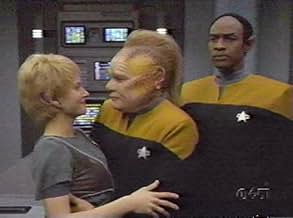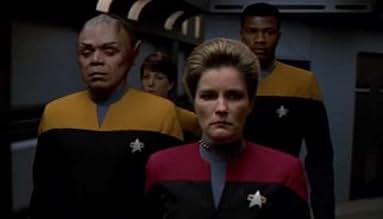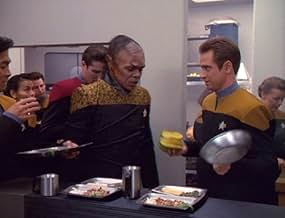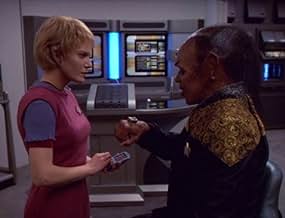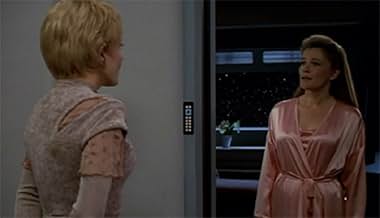Tuvix
- Episode aired May 6, 1996
- TV-PG
- 45m
IMDb RATING
7.7/10
2.7K
YOUR RATING
Transporter trouble merges Tuvok and Neelix into one, creating Tuvix.Transporter trouble merges Tuvok and Neelix into one, creating Tuvix.Transporter trouble merges Tuvok and Neelix into one, creating Tuvix.
Roxann Dawson
- Lt. B'Elanna Torres
- (as Roxann Biggs-Dawson)
John Copage
- Science Division Officer
- (uncredited)
Tarik Ergin
- Lt. Ayala
- (uncredited)
Holiday Freeman
- Transporter Chief
- (uncredited)
Kerry Hoyt
- Crewman Fitzpatrick
- (uncredited)
Bob Mascagno
- Holographic Accordion Player
- (uncredited)
Louis Ortiz
- Ensign Culhane
- (uncredited)
Featured reviews
This is quite an interesting episode with lots of ethical dilemma involved. When Tuvok and Neelix are merged into one individuum after a transporter accident, the first reaction of course is, to revert them back to normal. Unfortunately Kim, Torres and the doctor are unable to fix this mess although they have found out why this accident happened. Tuvix makes himself comfortable with this new situation and begins to accept his new reality. He starts to work like a normal officer on board the Voyager, makes friends and seems to be popular among the crew. It looks like he merged the best parts of both characters into one: He cooks better than Neelix now and his logical deductions are sprinkled with humor.
The dilemma though: When finally a possibility is found to revert the accident and restore Neelix' and Tuvok's life, Tuvix does not want to "die". He claims that he has a right to live this life. So, the question is: Is Tuvix' life worth more than the lives of Tuvok and Neelix? Does he even have the right to live in the first place or is he just the result of an accident? Is he really an indipendent individuum? After all he has the memories and skills of both Neelix and Tuvok - one could argue that he stole their lives and personalities and is only some sort of parasite, or an impostor as he points out in the beginning himself.
We then see a strong character moment from Janeway. She does not only have to make a decision but carry it out on her own, too. Mulgrew does a good job here again. She really embodies this tough captain figure.
Viewers seem to be devided if Tuvix deserves to live or not. I think, there is no simple truth here. Both sides have valid arguments to back their claims. I am on Tuvok's and Neelix' side though. Their existences were removed by an accident and if there is a chance to give them back their lives, this should count more than Tuvix' new existence. After all Tuvix was never born in classical sense. He also did not evolve his own character, he possesses the character traits and memories of Tuvok and Tuvix. In a way you could say, he is still Tuvok and Neelix, an amalgam of the two. By separating them again, you do not lose anything - you just give those two minds, trapped in one body, their original bodies back. If Tuvix had a completely different character, no memories of the two at all and would be something new and unique, the situation might be different.
The dilemma though: When finally a possibility is found to revert the accident and restore Neelix' and Tuvok's life, Tuvix does not want to "die". He claims that he has a right to live this life. So, the question is: Is Tuvix' life worth more than the lives of Tuvok and Neelix? Does he even have the right to live in the first place or is he just the result of an accident? Is he really an indipendent individuum? After all he has the memories and skills of both Neelix and Tuvok - one could argue that he stole their lives and personalities and is only some sort of parasite, or an impostor as he points out in the beginning himself.
We then see a strong character moment from Janeway. She does not only have to make a decision but carry it out on her own, too. Mulgrew does a good job here again. She really embodies this tough captain figure.
Viewers seem to be devided if Tuvix deserves to live or not. I think, there is no simple truth here. Both sides have valid arguments to back their claims. I am on Tuvok's and Neelix' side though. Their existences were removed by an accident and if there is a chance to give them back their lives, this should count more than Tuvix' new existence. After all Tuvix was never born in classical sense. He also did not evolve his own character, he possesses the character traits and memories of Tuvok and Tuvix. In a way you could say, he is still Tuvok and Neelix, an amalgam of the two. By separating them again, you do not lose anything - you just give those two minds, trapped in one body, their original bodies back. If Tuvix had a completely different character, no memories of the two at all and would be something new and unique, the situation might be different.
Gene Roddenberry, never in a million years, would have allowed the resolution in this episode. His Trek was uplifting and moral, not ends-justify-the-means cold brutality.
Even Spock, who Bones always accused of having ice water for blood, would have shown more intelligence, morality, and compassion than the Voyager crew does in this one.
As someone else said, this is a very sick episode. Not only is it not Trek, it's not good sci-fi, considering the lengths to which the series goes to portray those involved as protagonists.
Even Spock, who Bones always accused of having ice water for blood, would have shown more intelligence, morality, and compassion than the Voyager crew does in this one.
As someone else said, this is a very sick episode. Not only is it not Trek, it's not good sci-fi, considering the lengths to which the series goes to portray those involved as protagonists.
The science was ludicrous, even by Star Trek standards. The dilemma was contrived. And yet this episode seems have evoked some fairly extreme (and occasionally enraged) reactions from the reviewers. And that is why I rate this episode an 8. The central philosophical disagreement here hits a nerve. Several nerves, in fact, from issues of individuality vs collectivism, to the death penalty, to the question of sacrifice, to the debate over the will of the governed lending power to that of those who govern.
Pretty much the only thing I have to critique is the reviewing process itself. The fact that you hate/love the ultimate choice should be reason enough to rate this episode highly. You don't have to love the decisions of the characters to recognize that the writing and acting did exactly what they set out to do, and did it well...raise these questions and provoke thought.
The science was still ridiculous, even by Star Trek standards, so I feel comfortable knocking off a couple stars. Tom Wright's acting was superb, though. He sold the character and the issues it raised very well. A lesser performance might not have evoked such strong reactions.
Pretty much the only thing I have to critique is the reviewing process itself. The fact that you hate/love the ultimate choice should be reason enough to rate this episode highly. You don't have to love the decisions of the characters to recognize that the writing and acting did exactly what they set out to do, and did it well...raise these questions and provoke thought.
The science was still ridiculous, even by Star Trek standards, so I feel comfortable knocking off a couple stars. Tom Wright's acting was superb, though. He sold the character and the issues it raised very well. A lesser performance might not have evoked such strong reactions.
This was the most interesting episode so far. The concept, the overall story, the characters picked, the implications, the lack of judgment. Something more real than enforcing a right choice.
And sadly also something that rarely is dared more often. The need to satisfy often stands above real questions, real dilemmas, real no-win situations.
The execution is great.
I am sorry to say it, but if one criticizes science fiction for not being realistic is completely detached from science and reality. The whole point of going into fiction is to explain stories in a better way than reality might be able to. I think this episode is a wonderful example.
And sadly also something that rarely is dared more often. The need to satisfy often stands above real questions, real dilemmas, real no-win situations.
The execution is great.
I am sorry to say it, but if one criticizes science fiction for not being realistic is completely detached from science and reality. The whole point of going into fiction is to explain stories in a better way than reality might be able to. I think this episode is a wonderful example.
Tom Wright is this episode. I have watched this one countless times and his acting is sublime. One of my all time favorites if the whole Trek world.
Did you know
- TriviaTom Wright was eager to pursue the role of Tuvix when he first heard about it. While he had not previously watched Star Trek: Voyager (1995), he was acquainted personally with Tim Russ and Ethan Phillips, having often auditioned for the same roles as the former and having appeared in a play with the latter. When he originally read for the role, knowing little about Tuvok and Neelix, Wright instead based his portrayal on his knowledge and experience of Russ and Phillips.
- GoofsThough he is the more senior officer, Lieutenant Hogan addresses Ensign Kim as 'Sir'. This is because whilst Hogan is senior in rank, Kim is a Bridge Officer and part of the command crew. In this instance, Hogan is addressing Kim's seniority by position not by the rank on his collar.
This has been long held in terrestrial armies and navies for centuries up into the current times. An Officer In Command (OIC) is deferred to even though their actual held rank may be lesser. It is done to keep the command structure of the vessel intact. Also, the episode identifies Hogan as a crewman, making Kim a higher rank than him. His rank is inconsistently given as crewman, ensign and lieutenant in his various appearances.
- Quotes
[the Doctor has come up with a solution to separate Neelix and Tuvok]
The Doctor: I assure you, Mr. Tuvix, there's nothing to worry about. We've accounted for every variable.
Tuvix: Except one. I don't want to die.
- ConnectionsReferenced in Star Trek Timelines (2016)
Details
- Runtime
- 45m
- Color
- Sound mix
- Aspect ratio
- 4:3
Contribute to this page
Suggest an edit or add missing content

